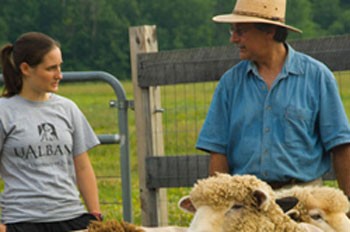Campus Project: Buying Locally
 |
Biology Professor Gary Kleppel raises hormone-free sheep and free-range chickens with his wife Pam at their Longfield Farm in Altamont, N.Y. |
For Biology Professor Gary Kleppel, who lives on a farm, buying locally means knowing the people who grow the fresh fruits and vegetables eaten by his family. But for an entire campus of 18,000 students, Kleppel's definition has eased a bit.
"I think it means buying regionally," said Kleppel, who is a member of UAlbany's Task Force on Environmental Sustainability. "When you have an institution that produces 20,000 meals a day and it buys locally, farmers can stabilize food prices for the community at large."
Recently, Kleppel and other environmental leaders organized a day-long conference at UAlbany focused on buying locally. At the event, local farmers, wholesalers, faculty, students and area college and university food service providers generated ideas on how campuses can buy more local foods, including meats, fruits and vegetables. They also discussed the challenges of such an endeavor.
The event, part of UAlbany's Campus Local Food Project, was highlighted by a keynote address by Shannon Hayes, author of Grass-Fed Gourmet and co-owner of Sap Bush Hollow Farm near Cobleskill.
Right now, Kleppel said, five percent of UAlbany's campus meals are made from local food. Kleppel said a goal would be to eventually increase the number to 70 percent.
UAlbany is one of the few state universities in the nation to offer grass-fed beef in its dining halls. This year, Chartwells purchased 25,000 pounds of grass-fed beef from a local livestock cooperative. Grass-fed beef is considered a healthy alternative because the cattle are allowed to graze on their natural diet.
The project's second phase will include a book, which will be co-authored by Hayes, Kleppel and other faculty and students. The upcoming book will "make the case" for buying locally and provide suggestions on how college campuses can do so.
"Buying food from local farms means getting food when it�s at its prime," said Kleppel. "So, buying locally will increase the quality of foods offered to students on campus, help sustain local farms and boost the regional economy."
![]() For more news, subscribe to UAlbany's RSS headline feeds
For more news, subscribe to UAlbany's RSS headline feeds


